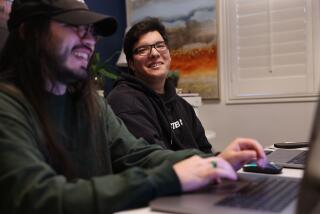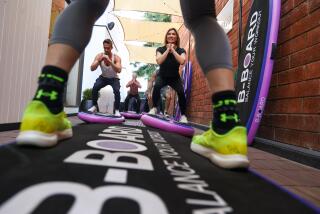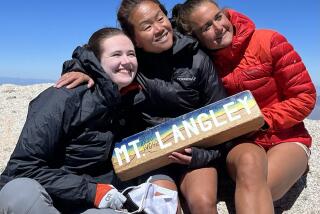Back in the Swim : Volunteer Pools Her Resources to Help the Handicapped
Evelyn duPont stood on the deck of the two swimming pools and looked down at water as beautiful in her eyes as the Mediterranean--water capable of miracles.
“This is my life . . . I call it my baby,” said duPont, 78, who is listed as among the most caring Americans by a charity in Washington.
More than 30 years ago, the Long Beach woman began welcoming the disabled to her back-yard pool while she recovered, through swimming, from polio. So many came that she needed to find a larger pool.
Now, in a many-windowed, chlorine-scented building on Long Beach Boulevard, she oversees California Pools for the Handicapped Inc. The facility depends on donations and is used free by some 3,000 people a year--senior citizens, the severely handicapped, arthritis sufferers and those seeking therapy after injuries or surgery.
“There should be something like this in every city in the world,” duPont said. “I can see people come in with a cane and, gosh, in another month they’re walking. And they’ve gained some more self-worth.”
Wearing a checked dress and fancy framed glasses, duPont greeted swimmers on a recent morning. Her stride gave no clue that she had been unable to walk.
By 9, when the pools opened, a line of men and women with gym bags formed outside the door. Some were aided by canes, others were in wheelchairs. After changing in dressing rooms, they descended a ramp into the larger of the two adjacent pools, heated to 90 degrees by solar panels on the roof.
On a pale green wall, adorned with painted palm trees and parrots, a sign reads: “New Horizons for the Handicapped . . . through Swimming .”
“As a person enters the water, the bonds of gravity are broken and the body is resurrected into a miraculous new dimension--freedom,” duPont said.
The larger pool filled quickly with people over 60, eager to soothe their arthritic aches and pains in the four-foot-deep water’s therapeutic warmth. Led by lifeguard Candy Morrison, they did exercises, letting the water’s resistance strengthen their muscles and joints.
The other pool--deeper, much smaller and with a hydraulic chair lift--was used to swim laps.
When Venus Bates, who has arthritis, emerged from the deep pool, she told duPont: “I don’t know how I could live without this place.”
Another testimonial quickly followed.
“Evelyn, I’m sure I’d be in a wheelchair by now if I hadn’t started coming here,” said Toni Lund, 65, of Bellflower. “My doctor said I needed a new knee. I decided I was going to do what I can first. I started swimming, and in three months I was able to go up my steps normally, and in six months I was running up my steps.”
Swimming has been heralded by the President’s Council on Physical Fitness and Sports. “No other physical activity,” it said, “offers such an unlimited possibility of exercise without the joint, bone and muscle problems. . .”
The days are busy at the pools, with groups from convalescent homes, school special-education programs and hospitals--including Rancho Los Amigos in Downey and the Veterans Administration and Navy hospitals in Long Beach--coming in regularly. Cerebral palsy victims, their necks ringed with orange life preservers, float happily as sunlight streams in.
“We have so many children that are so disabled,” duPont said. “We had a little girl and a little boy, and neither has arms or legs. I taught them to swim the dolphin motion--they’d flap their torsos like a fish would its tail to fan through the water. The boy got so good that he would do a back and front dive. What confidence. It was a sight to behold.”
Hank Fink, a recreational therapist in adult brain injuries at Rancho Los Amigos, often takes his patients to the pools. “The great thing is the temperature of the water,” he said. “We used to use private pools but the water was so cold that it made (the patients) too tense.”
He said the water improves balance, muscle tone and cardiopulmonary functioning.
The pools’ reputation is not just local.
“We service the world,” said duPont, who has lifesaving awards from the YMCA and Red Cross. She has gone to institutions around the country to describe her methods. And delegations from Japan, Brazil and Mexico have come to view her pools.
As a young Canadian, duPont was a competitive swimmer and coach who loved the water so much that she swam amid ice floes on the St. Lawrence River. “I thought I’d have fish scales when I got older,” she joked.
She was an aquatic star in the late 1940s and early ‘50s when water shows were in vogue. Wearing a gold lame suit she can still squeeze into, she performed at hotels along the Atlantic coast.
Wanting to swim year-round, she moved to California in 1950. Four years later, polio struck. “I was told I would never walk or swim again,” said duPont, who was 40 at the time. “I couldn’t believe what the doctor was telling me.”
DuPont had worked as a volunteer in Montreal with children who had polio, and she knew the benefits of water rehabilitation. So she had a pool built, with shallow steps and a chair lift, in the back yard of her east Long Beach home. She swam every day for long hours in a recovery that took 15 years before she could walk without braces.
“It was a miracle,” she said. “Now I’m walking in heels, dancing and showing off.” (A widow, she dances at swing clubs with “a few fellas I run around with.”)
While handicapped, she taught swimming and opened her pool to disabled children and adults. “I did that for 10 years in my back yard, and they were coming from all over,” she said. “It got out of hand.”
In 1963, she bought what had been the Long Beach Swim School on Long Beach Boulevard, just north of Artesia Boulevard, for $56,000. It had fallen into dangerous disrepair. “The electrician said we could have all been electrocuted, the wiring was so terrible,” she said. The wiring was fixed first, but with little money, other improvements came slowly. A low, brick wall still surrounded the pools for a time, and was easily scaled by neighborhood youngsters. DuPont would arrive most mornings to find a heartbreaking scene: wheelchairs at the bottom of the deep end.
One day, duPont brought the children inside the building and showed the facilities. “They were impressed,” she said. “I told them to watch the pools for us, and they did. Our walls are never defaced.”
The pools were enclosed in 1977. The city of Long Beach donated $25,000 for the roof and trade unions provided materials and manpower.
Compassion has been the cornerstone of duPont’s life. She adopted four handicapped children, including her secretary, Barbara duPont. They all can walk because of water rehabilitation, the pools’ founder said.
In 1987, the Caring Institute of Washington, whose motto is “Only a life lived for others is a life worthwhile,” named duPont as one of the country’s most caring persons. “I was dumbfounded,” she recalled. “I don’t know if I was worthy, but it was a wonderful happening for me.”
To ensure that her pools will stay open, she looks, day and night, for money. It takes $200,000 a year. “Wherever I go, I’m begging for funds,” she said. “They call me a ramrodder, and I am one because I never take no for an answer.”
The possibility of government funding never appealed to her. “Paperwork, paperwork, paperwork,” she said. “With our limited staff we wouldn’t be able to handle that.”
Large companies are regular contributors, and the city of Long Beach donates $11,000 a year, she said. The main fund-raisers are the Golden Crutch Ball in February and the Golden Crutch Swim Capade in August. But she still worries that her staff of seven is underpaid, that a new floor is needed, that more aquatic wheelchairs must be bought, that the sun won’t shine.
To hold down costs, a gas heater is turned on for only a brief period in the morning. “If we didn’t have the solar, our gas bill would be astronomical,” duPont said. “As long as we see the sun, we’re happy.”
Down in the shallow water, lifeguard Mike Conrad was going in with one of the special, wide-wheeled chairs to bring out a swimmer.
“I think we’re going to need some more of those pretty soon,” duPont said to W. Joe King Jr., her director, who runs the place while in a wheelchair because of polio. “You know a Santa Claus?”
“They’ve gone up from $800 to $1,600,” King told her.
“Oh, who can we write?”
DuPont probably will find someone.
“The angels fly overhead, believe me,” she said. “Just when I think we might have to close the doors, the next thing you know we get a little money and just keep plugging along.”
As the morning wound down, duPont sat by the door to say goodby as the senior-citizen swimmers left with damp hair and buoyant spirits. Husbands assisted wives, wives assisted husbands.
Thrilled, she too went out the door, to find a few more angels.


